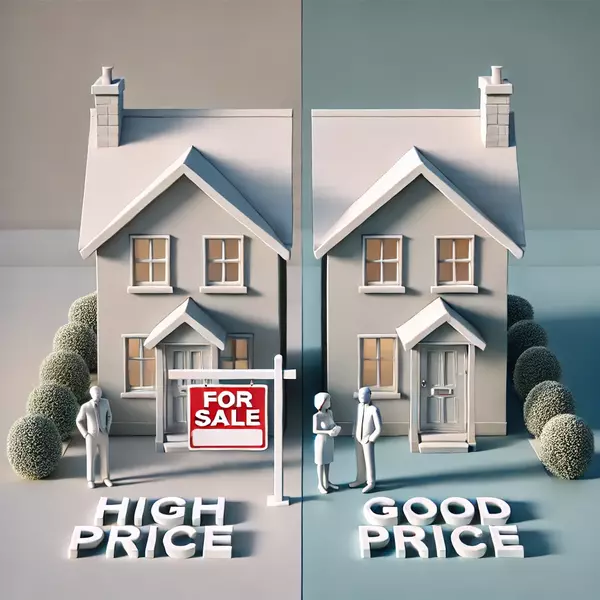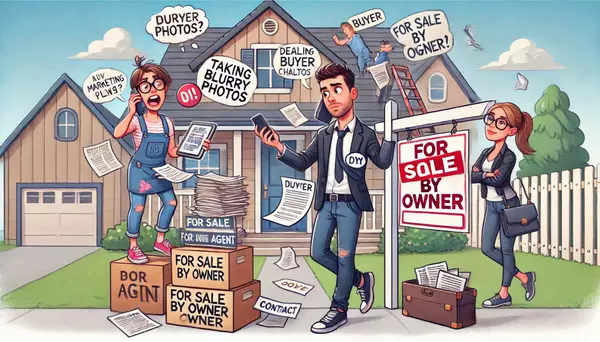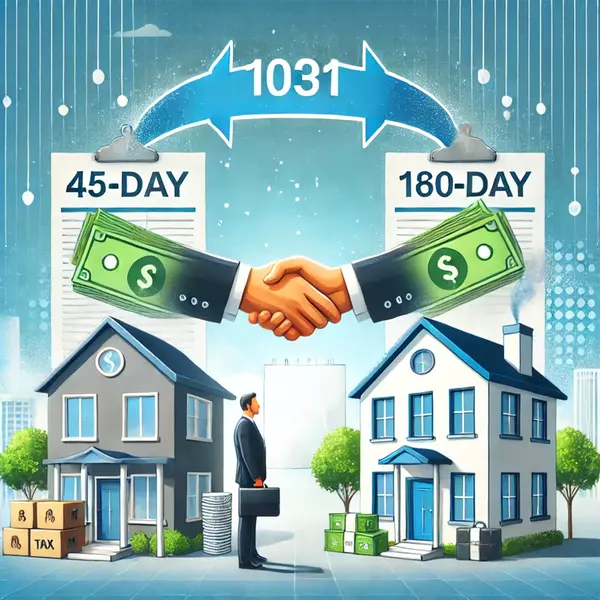Pricing Your House Right: Don’t Start Too High or it's All Downhill From There

So you’ve got your house all prepped and ready to hit the market, and you want top dollar for it, right? Naturally, you’re tempted to price it high to see what you can get. But here’s a truth every smart seller needs to know: When you price your house too high, there’s only one way negotiations are going to go—and that’s down. It’s not just buyers who know this; their agents know it too. And they’re all ready to pounce the minute they sense that you’ve overpriced your home. So let's talk about why starting high is like shooting yourself in the foot and how pricing right can actually help you get the best deal upwards. The One-Way Ticket: Why Negotiations Only Go Down When You Overprice Let’s be real for a moment—if you price your home above its true market value, buyers aren’t rushing in to pay the big bucks. Instead, they’re pulling out the magnifying glass, looking for every tiny flaw, and preparing to haggle. You see, overpriced homes make buyers think they have a bargaining advantage. They’ll start low, go lower, and suddenly you’re having awkward conversations about how much you need to slash your price just to make a deal. And it's not just buyers who sense a chance to cut you down. Buyer agents will see your home as a prime target for negotiation, coaching their clients to come in with lowball offers because they know you're up against a wall. Agents are trained negotiators, and the second they see your home’s inflated price, they know exactly how to play the game. When You Overprice, You Invite Lowball Offers The biggest danger of overpricing is that buyers and their agents will view your home as “room for negotiation.” And if that’s how they see it, they will always come in below your asking price—often way below. Even if a buyer likes your home, they’re going to come in lower because they assume that’s just what you do with an overpriced listing. Your original "high and mighty" price becomes irrelevant the moment they start talking numbers. Essentially, you’re starting a downward spiral from the very first showing. And once buyers see that you're willing to negotiate down, they'll keep pushing for a lower price, knowing you're the one with the pressure to sell. The Scarcity Mindset: Price It Right to Move It Up If you price your home realistically—or even slightly under market value—you flip the script entirely. Now, you’re not the one who’s going to be squeezed into lowering your price; you’re going to be the one receiving offers that go up. Pricing right from the start makes buyers realize they need to move fast to snag a great deal. And when there’s urgency, buyers are far more likely to offer you the price you're asking—or even above. Because nobody wants to lose out to another bidder. It’s basic psychology: Once buyers see others are interested in your home, their own FOMO (Fear of Missing Out) kicks in. And that’s when your listing price goes from a ceiling to a floor—the very floor that new offers keep climbing over. Be the Deal, Don’t Miss the Deal In real estate, the power of perception is everything. When buyers think your home is a steal, they’re ready to make their best offer—and sometimes better than their best. But when you start too high, all you’re doing is opening the door for buyers to come in low, nitpick everything, and make you lower your price until you’re practically paying them to take it off your hands. The moral of the story? Price it right from the beginning. Don't be the "oh, that house is still on the market" property that agents use as a benchmark for their clients to compare against better deals. Be the house that everyone wants and has to fight to get. Remember: Upward Bidding = Better Terms The beauty of competitive offers isn’t just the price. When buyers know they're competing for your home, they’re more likely to give you better terms—like waiving contingencies, being flexible with your move-out date, or even offering cash. Pricing right isn’t just about the sale price; it’s about setting yourself up for a smooth, stress-free closing that works in your favor. So forget the temptation to price high “just to see what happens.” You already know what happens: The price only goes down, and everyone—including buyers and their agents—knows it. Instead, start at a price that makes people sit up and say, “Wow, we need to see this one!” And once they’re hooked, let them do the heavy lifting by bidding up and fighting for your home. Price to attract, not repel—and watch how quickly those offers start stacking up. That’s how you really beat the market, my friends. 👊
Read More-

Selling High-End Homes with High-End Interest Rates: Strategies to Overcome Today's Market Challenges Ah, the luxury real estate market. The realm of opulent chandeliers, sprawling lawns, and kitchens larger than my first apartment. But in today's market, even the wealthiest buyers might balk at those high-end interest rates. Don't worry, though; I’m here to share some golden strategies to help you sell that high-end home without breaking a sweat. Grab your monocle and let’s dive in! 1. Showcase the Unique Value of Your Property When buyers are faced with higher interest rates, they become more discerning about where their money goes. To stand out, highlight what makes your property unique. Is it the state-of-the-art kitchen that would make Gordon Ramsay weep with joy? The infinity pool with a view that makes the horizon blush? The custom wine cellar that’s perfect for someone’s prized Pinot collection? Shine a spotlight on these features in your marketing materials. 2. Offer Financing Incentives Who doesn’t love a good deal? Offering to pay down points on the mortgage or contributing to closing costs can make your property more attractive. Think of it as throwing in a cherry on top of a very expensive sundae. This approach can ease the buyer's financial load and make the higher interest rates feel less daunting. 3. Emphasize the Investment Potential Luxury homes aren’t just places to live; they’re investments. Make sure potential buyers understand the long-term value of your property. Highlight recent trends in the local market, pointing out how property values have steadily increased. A high-end home in a prime location is often a safer bet than the stock market’s latest rollercoaster ride. 4. Professional Staging and Photography In the world of luxury real estate, presentation is everything. Professional staging can transform a space, making it feel both lavish and inviting. High-quality photography and video tours are essential to capture the imagination of buyers. Remember, you’re not just selling a home; you’re selling a lifestyle. And nothing says "buy me" like a perfectly lit shot of a marble bathroom that screams elegance. 5. Host Exclusive Events Why not add a bit of glamour to your sales strategy? Host exclusive open houses or private viewings with a touch of flair. Think champagne brunches, twilight garden parties, or an art show in the grand living room. Creating an experience around the viewing can help potential buyers fall in love with the property—and a little bubbly never hurt anyone. 6. Leverage International Markets High-end properties often attract buyers from around the world. Work with a real estate agent experienced in international sales to tap into this market. With the right connections, your stunning estate might be just what a wealthy investor in Dubai or a tech mogul in Silicon Valley is looking for. 7. Highlight Energy Efficiency and Smart Home Features Modern luxury buyers are not just looking for opulence—they want efficiency, too. Emphasize any energy-saving features like solar panels, smart home systems, or high-efficiency appliances. These can be huge selling points, especially for tech-savvy buyers looking to combine luxury with sustainability. 8. Be Flexible with Showings High-end buyers often have demanding schedules. Be willing to accommodate last-minute showings and offer virtual tours for those who can’t visit in person. Flexibility can make all the difference in capturing the interest of a busy executive or international buyer. 9. Work with an Experienced Luxury Real Estate Agent This might seem like a no-brainer, but working with an agent who specializes in luxury real estate is crucial. They have the know-how, the network, and the nuanced understanding of how to market and sell high-end properties in a challenging market. Closing Thoughts Selling a high-end home in a high-interest-rate market can feel like trying to sell ice to an Eskimo. But with the right strategies and a touch of creativity, you can turn potential roadblocks into stepping stones. Highlight the unique value of your property, offer enticing incentives, and create an unforgettable experience for buyers. Before you know it, that luxurious estate will be someone’s new dream home—and you’ll be toasting to a job well done (preferably with some of that leftover champagne). Ready to tackle the high-end market with high-end confidence? Let’s turn those high rates into high rewards! 🥂
Read More Staging a Home - The Hilarious Art of Pretending You Don't Live Here

Welcome back, savvy sellers and curious buyers! Today, we’re tackling the fine art of home staging—the ultimate exercise in pretending your house is a minimalist showroom where no one actually lives. Grab your decluttering gloves and sense of humor, because things are about to get funny! 1. Declutter Like You’re on a Reality Show First things first: get rid of everything that screams “real people live here!” This includes, but is not limited to, your extensive collection of mismatched socks, that tower of unread magazines, and the cat tree that’s more shredded than a rock star's jeans. Pro tip: Imagine you’re on a reality show called “Extreme Declutter: Home Edition.” Every item you toss out or hide is a point towards your sanity (and a sale). 2. Furniture: Less is More, Except When it’s Less Next, let’s tackle the furniture. The goal here is to make your rooms look spacious and inviting, which means ditching that overstuffed recliner that’s more nap spot than seat. Keep it simple, keep it elegant, and whatever you do, keep it upright. And if you’ve got that one chair that always looks like it’s considering a nap, maybe it’s time to bid it farewell—at least until the open house is over. 3. The Kitchen: Master Chef, Minimalist Style Ah, the kitchen—the heart of the home and the room where we pretend we don’t just microwave leftovers. Clear those countertops! All of them! The toaster, coffee maker, and that weirdly specific banana stand? They’re taking a vacation. Channel your inner minimalist chef. Leave out only the essentials: a bowl of fresh fruit, a vase of flowers, and maybe one artisanal loaf of bread (because nothing says “I have my life together” like carbs on display). 4. Bedrooms: Hotel Chic, Not Hoarder Sheik Bedrooms should feel like a serene retreat, not the backdrop for a “before” photo on a home makeover show. Strip it down to the basics: bed, nightstands, and a hint of decorative flair. Make your bed look like it belongs in a 5-star hotel—fluffed pillows, crisp sheets, and absolutely no sign of your 3 a.m. snack crumbs. 5. Bathrooms: Spa Day Vibes Only Your bathroom should feel like a spa oasis. So, toss those half-used bottles of shampoo and that questionable loofah. Bring in fresh towels, maybe some fancy soap, and definitely light a candle or two. If you can’t imagine yourself taking a 2-hour bubble bath in there, keep staging. 6. Living Room: Cozy Yet Classy The living room should invite buyers to sit down and stay a while—but not too long, because, you know, open house rules. Arrange the furniture to create a welcoming flow, add some tasteful decor, and hide all evidence of last night’s Netflix binge. Remember, you’re not just selling a home; you’re selling a lifestyle. And that lifestyle does not include your collection of action figures or the remote you can never find. 7. Outdoor Spaces: Party-Ready Patios Finally, let’s not forget the outdoor spaces. Mow the lawn, trim the hedges, and hide the garden gnome that’s been giving your neighbors nightmares. Set up a patio table, maybe some fairy lights, and voilà! Your backyard is now the perfect spot for imaginary summer soirées. The Grand Finale: The Illusion of Perfection Staging a home is all about creating the illusion of a perfect life—a life where the laundry is always folded, the dishes are always done, and there’s not a Lego in sight. It’s a bit of a comedy act, but one that can pay off big time. So, laugh through the chaos, enjoy the process, and remember: the more absurd it feels, the closer you are to staging success. Here’s to turning your lived-in home into a buyer’s dream! Stay tuned for more tips, tricks, and chuckles here at The Earnestly Estates Blog. Until next time, happy staging!
Read MoreWhy my house is still for sale...

Why My House is Still For Sale: The Importance of Pricing CompetitivelyWhen it comes to selling your house, there are numerous factors that influence its marketability. From location and presentation to marketing strategies and timing, sellers have a lot to consider. However, one aspect that holds significant weight and can make or break a sale is the asking price. In this blog post, we will discuss why pricing your house competitively is the biggest tool you have to create appeal in the marketplace.Setting the right price for your property is crucial in attracting potential buyers. While it's natural to want to maximize your profit, setting an unrealistic price tag can deter buyers from even considering your property. In today's competitive real estate market, buyers are savvy and have access to a plethora of information at their fingertips. They are well aware of market trends, recent sales, and comparable properties in the area. Thus, overpricing your house will not only deter buyers but also convey a lack of seriousness or desperation to sell.To effectively price your house, it's important to conduct thorough research and analysis. Consider working with a real estate agent who has expertise in your local market. They can provide you with valuable insights and help you determine a fair and competitive price for your property. By analyzing recent sales in your area, they can identify the price range that aligns with market trends and buyer expectations.Pricing your house competitively doesn't mean undervaluing your property. It means strategically positioning it within the market to attract potential buyers. When priced right, your house will generate more interest, potentially leading to multiple offers and even a bidding war. This can result in achieving a higher sale price than initially anticipated.Another advantage of pricing your house competitively is the reduced time it spends on the market. Homes that are overpriced tend to languish, often becoming stale listings that are overlooked by buyers. The longer a house sits on the market, the more likely buyers will question its value or assume that there may be underlying issues. On the other hand, a well-priced house will generate immediate interest, creating a sense of urgency among buyers.It's important to remember that the asking price is not set in stone. If your house has been on the market for an extended period without any offers, it may be an indication that the price needs to be adjusted. Pay attention to feedback from potential buyers and be open to reevaluating your pricing strategy. A price reduction can reinvigorate interest in your property and attract a new pool of buyers.In conclusion, pricing your house competitively is the most essential tool you have to create appeal in the marketplace. It is crucial to set a fair and realistic asking price that aligns with market trends and buyer expectations. By doing so, you can attract more potential buyers, potentially spark a bidding war, and reduce the time your house spends on the market. Remember, pricing strategically doesn't undervalue your property; it positions it to stand out amidst the competition. So, if you find yourself wondering why your house is still for sale, take a closer look at your pricing strategy and make the necessary adjustments.
Read More
Recent Posts









